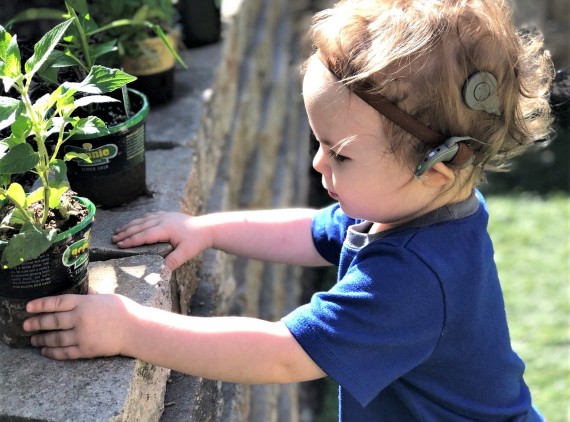The experts at Phoenix Children’s Cochlear Implant Program can help children with hearing differences achieve their communication goals.
A cochlear implant is more than a hearing aid - it's a device that converts sound waves in the air to an electrical signal that is sent through a tiny wire in the inner ear (cochlea) directly to a nerve that carries that signal to the brain. This allows a cochlear implant to provide sound to children even with very severe hearing loss. When an implant is placed soon after the hearing loss is diagnosed and the child receives the therapy and education they need, an otherwise healthy child can even develop normal speech.
Hearing loss is one of the most common problems discovered at birth with about three out of a thousand children born with hearing loss. Most of these children do very well with hearing aids and some assistance at school. About one out of a thousand children is born with hearing loss so severe that they can't benefit from hearing aids. For those children, options for communication include sign language, using a specially made electronic communication device, or listening and spoken language through cochlear implantation.
Placing a cochlear implant requires surgery, but before surgery, there are several steps in the process to make sure that it is the right choice for the patient and family. At Phoenix Children's, the specialists work as a team to help children and families with severe to profound hearing loss achieve their potential. For most of these families, their goal is to achieve listening and spoken language and a cochlear implant can help them reach that goal. The Cochlear Implant Program also helps to care for children with more complex needs who may not be able to communicate verbally but still benefit from exposure to sound. Being aware of the sounds around them helps these children to interact with others and to increase their knowledge of the world.
Phoenix Children's Cochlear Implant Team
Patients see an audiologist (hearing specialist), an ear, nose and throat (ENT) surgeon (otolaryngologist), a psychologist and a speech therapist who specializes in working with children who have hearing loss. Many of these kids will also see a geneticist, an ophthalmologist, and other specialists, depending on their medical needs. They will be connected to organizations specialized in hearing loss to support these children and their families. At Phoenix Children's, no member of the care team works in isolation. All meet frequently and share important information to support our families.
Initial diagnosis of hearing loss can be a confusing and stressful time for parents. The Cochlear Implant Program at Phoenix Children's was formed to help families navigate this process and to provide the information they need to make educated choices about hearing loss.

